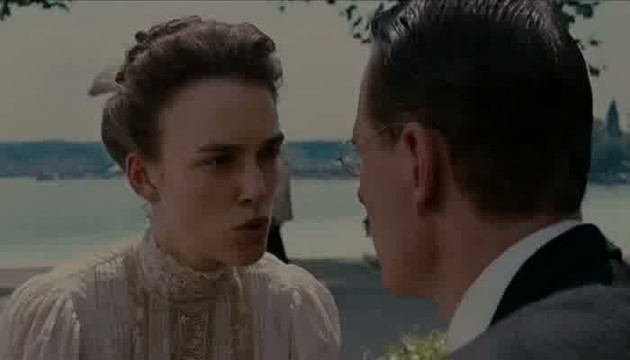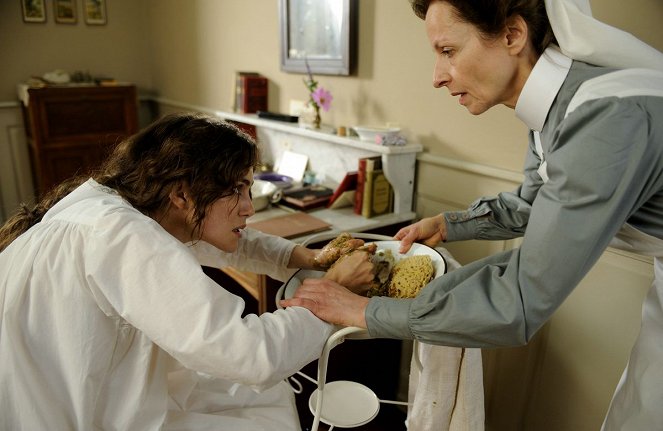Regie:
David CronenbergKamera:
Peter SuschitzkyMusik:
Howard ShoreBesetzung:
Michael Fassbender, Keira Knightley, Viggo Mortensen, Vincent Cassel, Sarah Gadon, Katharina Palm, André Hennicke, Arndt Schwering-Sohnrey (mehr)Streaming (5)
Inhalte(1)
In einer Zeit des gesellschaftlichen Wandels treffen die beiden wichtigsten Analytiker der menschlichen Psyche aufeinander: C.G. Jung (Michael Fassbender) und Sigmund Freud (Viggo Mortensen) arbeiten an bahn brechenden Erkenntnissen, die das moderne Denken revolutionieren sollen. Als die verführerische Sabina Spielrein (Keira Knightley) auftaucht, geraten sie an ihre Grenzen... In seine Klinik in Zürich eingeliefert, ist Sabina für Jung nicht nur eine psychisch labile Patientin von vielen. Der geheimnisvollen Anziehungskraft seines Studienobjekts kann er sich nicht entziehen und eine leidenschaftliche Affäre beginnt. Als diese jäh endet, flüchtet Sabina zu Jungs Mentor Sigmund Freud nach Wien, der sich ihrer Faszination ebenso wenig entziehen kann. Er nimmt sie bei sich aus und bildet sie zur Analytikerin aus. So wird Sabina Spiel-rein letztlich zur Muse beider.
In dieser fatalen Dreiecksbeziehung verschwimmen die Grenzen ihrer Wissenschaft in einem Strudel aus geheimen Sehnsüchten, tief verwurzelten Ängsten und unterdrückter Begierde. In einem Machtkampf intellektueller Eitelkeiten werden aus einstigen Freunden erbitterte Gegenspieler.
(Universal Pictures Germany)
Videos (21)
Kritiken (12)
Ein jugendstilähnlich reiner Filmstil über die schmutzige Innenwelt einer Person. Ein komplexes Beziehungsnetzwerk Mann x Frau, Vater x Sohn, Freudismus x Jungismus - dabei ist doch das ganze sehr einfach und zugänglich ... Meisterhafte Regieführung, ein atemberaubender Mortensen, ein präziser Fassbender sowie die überraschend dämonische Keira Knightley (höchstwahrscheinlich in der Rolle ihres Lebens). Und ein Drehbuch mit Dialogen, die so lebhaft, lustig und intelligent sind, dass ich dieses Werk als eines der besten Erlebnisse der letzten Monate erachte.
()
In diesem Fall hat Verbal wieder einmal die Hauptsache benannt, um die es in diesem Film geht. Oder: ein tolles Thema, aber ein ungewöhnlich schlechtes Casting. Ich würde gerne mehr von diesem dekadent ungezähmten Zürich erleben, aber wenn man das nicht kann, war’s das.
()
Mit Fräulein Spielrein würde ich spielen und mit Freud eine Zigarre rauchen. Seine Dialog-Kränzchen mit dem formbaren und unentschlossenen Jung sind aber nichts für mich, da würde ich mich lieber an den Zürichsee setzten. Mortensen ist ausgezeichnet und die Bildästhetik köstlich, es sind aber keine Emotionen da. Ein Film, in dem Mainstream-Schauspielstars Phrasen vortragen, die nur ein Minimum der Zuschauer*innen verstehen wird. Bitter Moon von Polański erzählte über die dunklen Seiten der menschlichen Sexualität poetisch und mit Leidenschaft.
()
Cronenberg gives a brief insight into the core ideas of Freud and his pupil Jung in an audience-friendly and simple form, which is a rare and welcome gift compared to complexly worded lectures on psychoanalysis or literary scholarly attempts to interpret their work. Yet, thanks to the breathtaking performances of all three leading characters and the masterfully written dialogues that often provide a hidden point, I find Cronenberg's film also attractive for the audience.
()
A rather logical step (forward) in Cronenberg's filmography. From practice, i.e. obscure, low-budget independent horror movies (Shivers, Rabid, The Brood), and obscure, bigger-budget horror movies (Videodrome, The Dead Zone, The Fly), the director worked his way up to theory and started making polished dramas with capital from major Hollywood studios. The subversiveness of the earlier metaphysical body horror movies (a genre for which he holds the copyright) has not disappeared from his more recent films, but it is more artfully hidden and thus all the more dangerous. Just like the dark ideas. Safely tucked away in our subconscious until two gentlemen began to ferret them out at the beginning of the 20th century. Contemporary observers perceived the method employed by the fathers of psychoanalysis as talk therapy. Patients talked; Freud and Jung listened. The Dangerous Method adopts this approach, but with the difference that Freud and Jung talk through most of the film while we listen. Cronenberg’s favourite themes of sexual repression and the destructive power of sexual desire are addressed using a straightforward yet refined vocabulary and subtle hints. The most fascinating development takes place in the case of the father-son relationship between two men for whom each other’s existence gradually becomes both a driving force and something that they would rather deny. In the spirit of the axiom that a doctor must get sick in order to know what illness he is treating, The Dangerous Method is a clinical study of an unorthodox love triangle. The base of that triangle is Jung, a man with an admirable appetite who, with regard to others, does not place restrictions on himself either in terms of food (with Freud’s family at the table) or in terms of sex (he clearly feels no remorse for his infidelity). More than for himself, this egoism is thus destructive for the other two crucial people in his life, i.e. for Sabina, who undergoes a convincing transformation from a patient to a doctor (see the first and last shots of the film), which is critical for the plot, as well as for Freud. We peculiarly see Jung with them only on the boat that his wife gives him. For viewers who are familiar with basic psychoanalytical concepts, the comprehensibly composed Freudian symbolism provides a guide for finding one’s bearings in the labyrinth of desires that the characters allow themselves to be controlled by (Otto Gross, libido personified, could be Jung's unbridled id, whereas the authoritative Freud represents his restrictive superego). The Dangerous Method is a drama that is thoroughly well thought out on at least two levels, where the upper level – understanding – reveals the director’s mastery of the classic narrative style. No editing goes to waste, the composition of the shots is impressively economical thanks to the great depth of field, the placement of the characters in space reflects the relationships of voluntary and forced subordination and dominance between them, the narrative is fluid and focused, and the intertwining of the romantic and professional storylines is almost perfect. With this film, I believe the Canadian eccentric has advanced to the category of great directors. 85%
()
(weniger)
(mehr)



Werbung